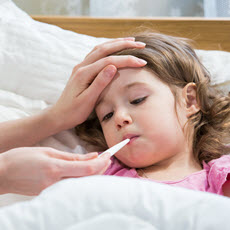
New on the MedlinePlus Respiratory Syncytial Virus Infections page:
Respiratory Syncytial Virus Infections
Also called: RSV
MEDICAL ENCYCLOPEDIA
National Institutes of Health
Respiratory syncytial virus (RSV) causes mild, cold-like symptoms in adults and older healthy children. It can cause serious problems in young babies, including pneumonia and severe breathing problems. Premature babies and those with other health problems have the highest risk. A child with RSV may have a fever, stuffy nose, cough, and trouble breathing. Lab tests can tell if your child has the virus. There is no specific treatment. You should give your child fluids to prevent dehydration. If needed, you can also give a pain reliever (not aspirin) for fever and headache.
RSV easily spreads from person to person. You can get it from direct contact with someone who has it or by touching infected objects such as toys or surfaces such as countertops. Washing your hands often and not sharing eating and drinking utensils are simple ways to help prevent the spread of RSV infection. There is currently no vaccine for RSV.
Centers for Disease Control and Prevention
- Respiratory Syncytial Virus (RSV) Test
 (National Library of Medicine)Also in Spanish
(National Library of Medicine)Also in Spanish
- Protecting Your Baby from RSV (American Academy of Pediatrics)Also in Spanish
- Respiratory Syncytial Virus Infection (RSV): Transmission and Prevention(Centers for Disease Control and Prevention)
- Respiratory Syncytial Virus (RSV): Treatment
 (National Institute of Allergy and Infectious Diseases)
(National Institute of Allergy and Infectious Diseases)
- Bronchiolitis (American Academy of Family Physicians)Also in Spanish
- Respiratory Syncytial Virus (RSV): Trends and Surveillance(Centers for Disease Control and Prevention)
- ClinicalTrials.gov: Bronchiolitis
 (National Institutes of Health)
(National Institutes of Health) - ClinicalTrials.gov: Respiratory Syncytial Virus Infections
 (National Institutes of Health)
(National Institutes of Health)
- Article: Risk factors for severe bronchiolitis caused by respiratory virus infections...
- Article: The burden of respiratory syncytial virus (RSV) associated acute lower...
- Article: Identification of IFN-γ and IL-27 as Critical Regulators of Respiratory...
- Respiratory Syncytial Virus Infections -- see more articles
- Bronchiolitis (For Parents) (Nemours Foundation)Also in Spanish
- Respiratory Syncytial Virus (RSV) (March of Dimes Birth Defects Foundation)Also in Spanish
- Respiratory syncytial virus (RSV) (Medical Encyclopedia)Also in Spanish
- RSV antibody test (Medical Encyclopedia)Also in Spanish























.png)











No hay comentarios:
Publicar un comentario